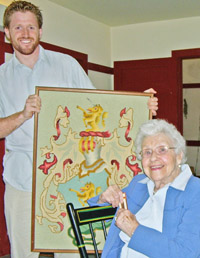Canadian Mennonite
Volume 13, No. 2
Jan. 19, 2009
‘Good memories’
Living link to pioneer days in Waterloo County revisits family home/Mennonite museum
Waterloo, Ont.
 |
“They made things well in those days,” she says, holding her hands apart to illustrate the sturdiness of the beams of Brubacher House. “It’s going to stand for another hundred years.”
Dorothy Schweitzer Elliott is speaking of her family home—now a University of Waterloo museum operated by the Mennonite Historical Society of Ontario and Conrad Grebel University College—but she could be describing herself. At 101, Elliott provides a living link to Waterloo County’s pioneer days.
Last spring, Elliott visited Brubacher House, where she had lived as a young girl, and was able to identify many of the house’s artifacts. These included a wall hanging of the Brubacher family tree she had made from pure wool imported from Scotland, and two tea-sets which had belonged to John E. Brubacher and his wife Magdalena, her great-grandparents.
Elliott herself was “nearly born in a barn on a Sunday,” on June 2, 1907, to a family related to theologian/physician Dr. Albert Schweitzer on her father’s side, and to the Brubachers on her mother’s side. Elliott’s Brubacher family came to Canada in 1806 from Pennsylvania.
Elliott’s grandmother, Anna, known as Nancy, was the third of John E. Brubacher’s daughters. When she was a little girl, she lived with her parents, sisters and grandparents in the Brubacher House, which had a log-house addition on the back and which included as many as seven bedrooms.
As a child, Elliott attended the Mennonite church in Bloomingdale, Ont., where she recalls meeting the girl who would be her best friend for 87 years, and also remembers the two of them “being bad” as they crawled under the seats during long prayers to pinch the legs of adults before scurrying back. Elliott played the organ and later the piano at the Bloomingdale church for more than 80 years.
She and her sister Olive used to dress up in long dresses and give tours of Brubacher House when it first became a University of Waterloo museum, and they were also among the founders of the Pennsylvania German Folklore Society, for which she played the piano for 20 years.
Elliott believes it is vitally important for Brubacher House to keep operating, so that people will understand what life was like for early Mennonites in Waterloo County. She pulls out a letter written by her mother, describing the transformation she had witnessed from times when streetcars were pulled by horses, bears were common and people used stumps for kitchen tables, to modern 20th century life.
Today, Elliott has outlived most of her contemporaries and relatives. She lives in a comfortable apartment in Waterloo’s Luther Village, where she knits mittens for children, visits with friends, listens to church services and stock reports on the radio, and remembers.
Her mind still sharp and her face alert but peaceful, Elliott says, “When you get to be my age, you don’t need to go out. You have memories. Good memories.”